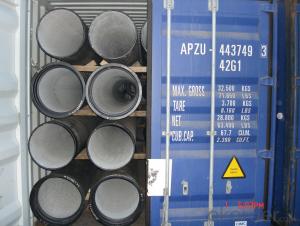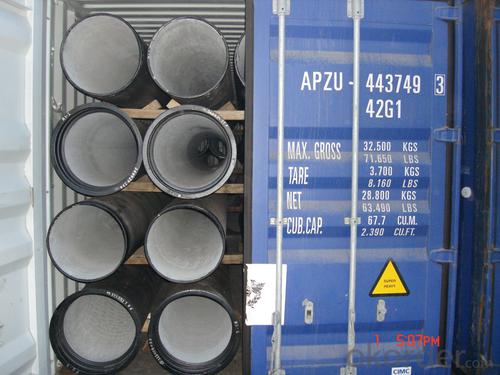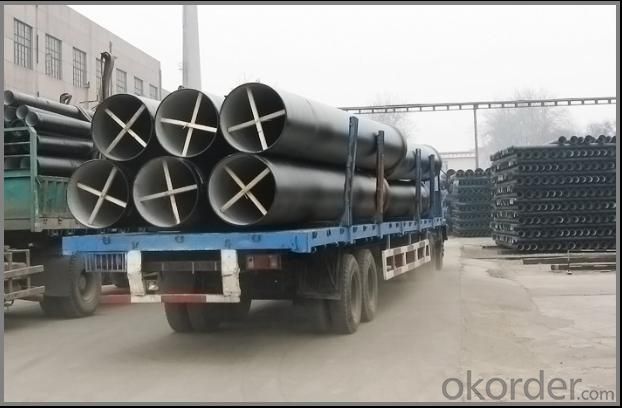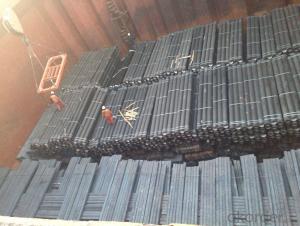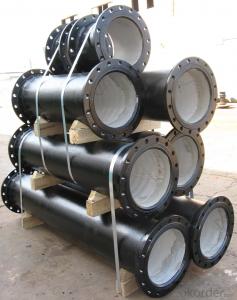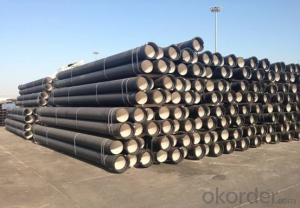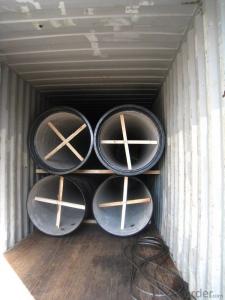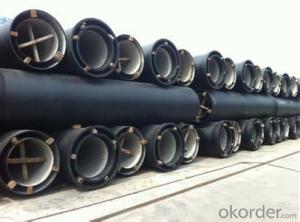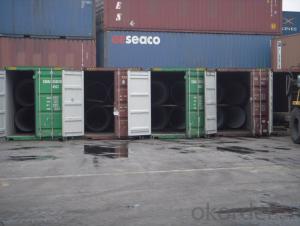DUCTILE IRON PIPES C Class DN350
- Loading Port:
- China Main Port
- Payment Terms:
- TT OR LC
- Min Order Qty:
- -
- Supply Capability:
- -
OKorder Service Pledge
OKorder Financial Service
You Might Also Like
Ductile Iron Cast Pipe is without any defects compare with tradition casting tech, which has many advantages particularly as follow:
(1) High density. In the "vertical upward casting" process, the melt iron of centre liquid column in center crystallizer is continuously feeding for volume shrinkage caused by condensation tube at outer circumference , which lead to be free of shrinkage porosity.
(2) High purity. When melt iron pouring, the mixed impurities such as gas, dross, sand grain which are lighter than melt iron could be eliminated at furnace mouth, its impossible to enter into the crystallizer through the channel, so the melt iron into the crystallizer is very pure.
(3) Strength with toughness. The cooling speed provided by continuous crystallizer is 30 times than sand casting and 5 times than centrifugal casting, and doesn't produce white iron, the eutectic cell volume of continuous cast iron is one eighth to one tenth compare with traditional cast iron. The density of graphite nodule in ductile iron can reach 300-700 pcs/mm2. Therefore, all reason above improve the strength and toughness of continuous cast iron.
(4) Free machining. The high speed cooling make the hardening phase (such as boride, steadite) not appear like reticular, massive or thick, but diffuse like fish bone and pane in shape, moreover, there are tiny graphite flakes inlaid hardening phase. It's free machining in BrinellHardness the range of 250-300HB. However, the Brinell Hardness of 250 is top limit to common metal materials.
(5) Uniform composition of tube wall. The convection mixing of liquid column caused by marching type drawing in crystallizer make the composition of tube wall well-distributed, and concentration gradient very little.
(6) High productivity. To the wall thickness of tube under 10mm, the speed of continuous casting is 1 meter/min, to the wall thickness of tube under 20mm, the speed of continuous casting is 0.5 meter/min, which is high efficiency that centrifugal or other casting tech couldn't reach.
- Q: What is the maximum operating pressure for ductile iron pipes?
- The maximum operating pressure for ductile iron pipes typically ranges from 350 to 500 psi, depending on the specific diameter and class of the pipe.
- Q: Can ductile iron pipe be used for both water and sewage applications?
- Yes, ductile iron pipe can be used for both water and sewage applications. It is a durable and versatile material that is resistant to corrosion and can handle the pressure and flow requirements of both water and sewage systems.
- Q: How do ductile iron pipes perform in cold weather conditions?
- The exceptional performance of ductile iron pipes in cold weather conditions is well-known. Unlike cast iron or PVC, ductile iron exhibits remarkable resistance to low temperatures. This resistance is primarily attributed to its unique microstructure, which enables it to maintain its structural integrity even in extreme weather conditions. In freezing temperatures, ductile iron pipes demonstrate a low coefficient of thermal expansion, meaning they do not contract or expand significantly with changes in temperature. This characteristic ensures their stability and prevents cracking or bursting. Additionally, the high impact resistance of ductile iron further enhances its ability to withstand the stress imposed by cold weather conditions. Moreover, ductile iron pipes are equipped with a protective lining, typically composed of cement mortar or epoxy. This lining acts as an additional barrier against the effects of cold weather, preventing the formation of ice on the inner surface of the pipes. Consequently, the risk of blockages or reduced flow capacity is greatly reduced. In conclusion, ductile iron pipes are a reliable choice for cold weather conditions. Their durability, low thermal expansion, and protective lining make them highly resistant to the challenges posed by freezing temperatures. Whether used for water supply, sewer systems, or other applications, ductile iron pipes have consistently proven their effectiveness even in the harshest winter climates.
- Q: What are the meanings of cast iron pipe wall thicknesses LA, A and B respectively?
- You are mistaken in concept. The cast iron pipe is the sort of connection method. The ductile iron pipe is classified according to the material.
- Q: What are the common causes of failure in ductile iron pipes?
- There are several common causes of failure in ductile iron pipes. One major cause is corrosion. Over time, the exposure to water, soil, and other environmental factors can lead to the formation of rust and corrosion on the pipe's surface. This can weaken the structural integrity of the pipe and eventually lead to failure. Another common cause is improper installation or handling. If the pipes are not installed correctly or if they are mishandled during transportation or installation, it can result in cracks, fractures, or other physical damage. These defects can compromise the functionality of the pipe and contribute to its failure. Inadequate design is another factor that can lead to failure. If the pipe is not designed to withstand the anticipated loads, pressures, or environmental conditions, it can become susceptible to premature failure. The pipe's material properties, wall thickness, and diameter must be carefully considered during the design process to ensure it can handle the expected demands. Poor maintenance and lack of timely repairs can also contribute to failure. Regular inspections, maintenance, and prompt repairs are necessary to identify and address any issues before they escalate. Failure to do so can result in the gradual deterioration of the pipe, making it more prone to failure. Lastly, external factors such as soil movement, seismic activity, or excessive traffic loads can also cause failure in ductile iron pipes. These external forces can exert stress on the pipe, leading to cracks, fractures, or even complete failure. To prevent failure in ductile iron pipes, it is essential to employ proper corrosion protection techniques, follow correct installation procedures, ensure adequate design considerations, implement regular maintenance and repair programs, and account for external factors during the planning and installation process.
- Q: What are some common applications for ductile iron pipe?
- Ductile iron pipe is commonly used in various applications including water and wastewater systems, underground drainage systems, oil and gas pipelines, industrial piping systems, and fire protection systems. Its strength, durability, and resistance to corrosion make it suitable for these applications, ensuring reliable and long-lasting performance.
- Q: What is the cost of ductile iron pipe compared to other pipe materials?
- The cost of ductile iron pipe compared to other pipe materials can vary depending on various factors such as the size, length, and specific requirements of the project. However, generally speaking, ductile iron pipe tends to be more expensive than some of the alternative pipe materials such as PVC or HDPE (high-density polyethylene) pipes. Ductile iron pipe is known for its exceptional strength and durability, making it suitable for a wide range of applications including water distribution, wastewater systems, and industrial piping. Its robustness and longevity contribute to its higher cost compared to other pipe materials. On the other hand, PVC and HDPE pipes are often more affordable options due to their lower production and material costs. Additionally, these materials are lightweight, easy to install, and resistant to corrosion, which can lead to cost savings during installation and maintenance. It is important to note that while ductile iron pipe may have a higher upfront cost, its superior strength and longevity can result in long-term cost savings by minimizing the need for frequent repairs or replacements. The choice of pipe material should be made considering the specific project requirements, budget constraints, and the anticipated lifespan of the infrastructure.
- Q: Can ductile iron pipes be used for irrigation of golf courses?
- Yes, ductile iron pipes can be used for irrigation of golf courses. Ductile iron pipes are known for their durability, strength, and resistance to corrosion, making them suitable for various applications, including irrigation systems. They can withstand high-pressure water flow and are less likely to crack or break compared to other materials. Additionally, ductile iron pipes have a longer lifespan, reducing the need for frequent maintenance or replacement. Therefore, they are a reliable choice for irrigating golf courses, where a consistent and efficient water supply is crucial for maintaining healthy turf and landscaping.
- Q: Are ductile iron pipes compatible with other pipe materials?
- Generally, other pipe materials can be compatible with ductile iron pipes. The high level of flexibility and strength of ductile iron pipes allows for their connection with various materials like PVC, HDPE, and steel. Transition fittings are often utilized to securely and prevent leaks when connecting ductile iron pipes with other materials. To maintain the integrity of the pipeline system and ensure compatibility, it is crucial to follow industry standards and guidelines when joining different pipe materials.
- Q: Can ductile iron pipe be used in corrosive environments?
- Yes, ductile iron pipe can be used in corrosive environments. Ductile iron is known for its ability to resist corrosion and has been widely used in various applications where corrosion resistance is required. The corrosion resistance of ductile iron is due to its protective oxide layer, which forms naturally on its surface and acts as a barrier against corrosive elements. Additionally, ductile iron pipes can be coated with various protective coatings such as polyethylene or epoxy to enhance their resistance to corrosion. These coatings provide an extra layer of protection, making ductile iron pipes suitable for use in highly corrosive environments such as wastewater treatment plants, industrial plants, and marine applications. However, it is important to consider the specific corrosive elements present in the environment and consult with experts or follow industry standards to ensure the appropriate coating and maintenance practices are implemented for long-term performance and durability.
Send your message to us
DUCTILE IRON PIPES C Class DN350
- Loading Port:
- China Main Port
- Payment Terms:
- TT OR LC
- Min Order Qty:
- -
- Supply Capability:
- -
OKorder Service Pledge
OKorder Financial Service
Similar products
Hot products
Hot Searches
Related keywords
